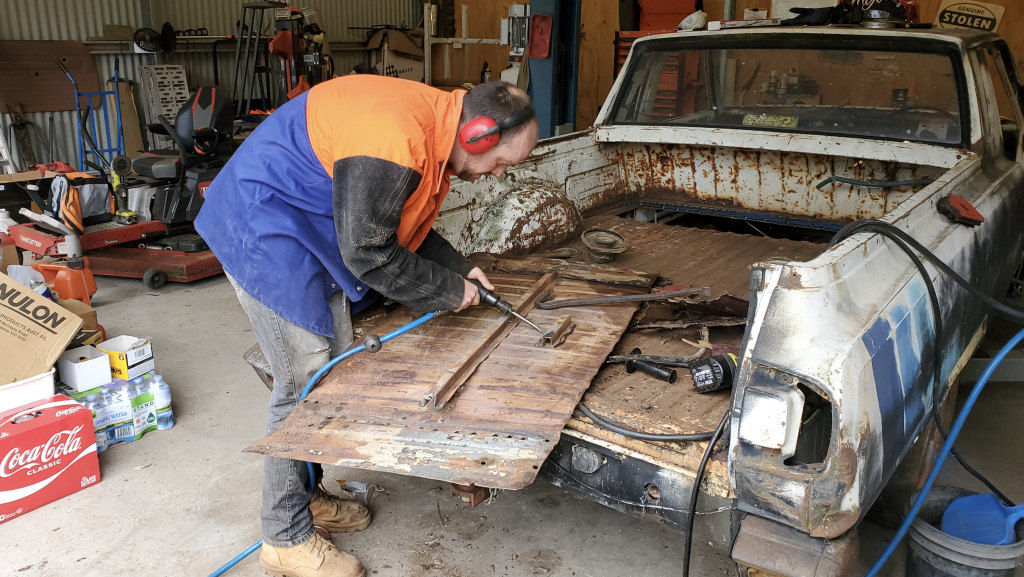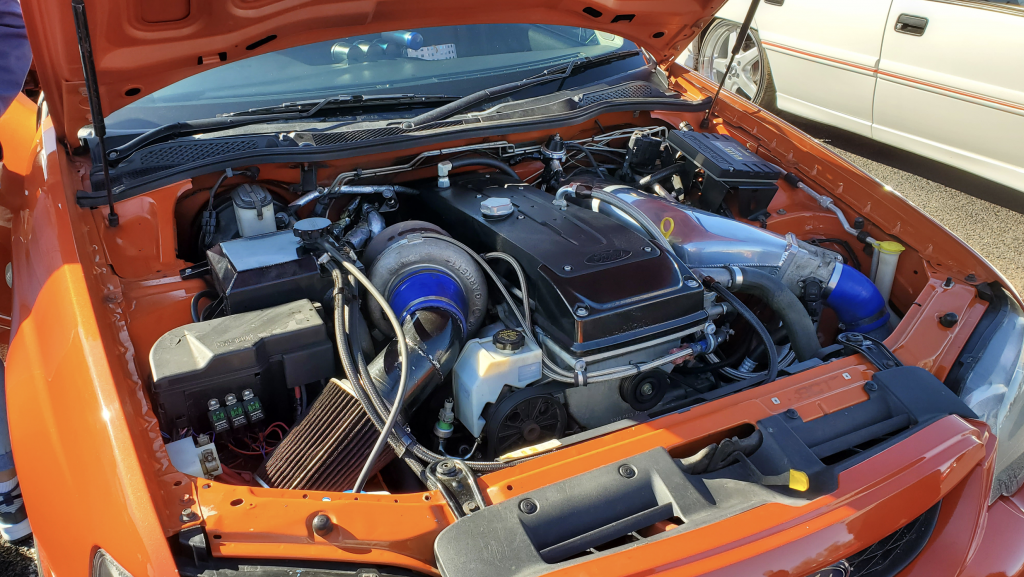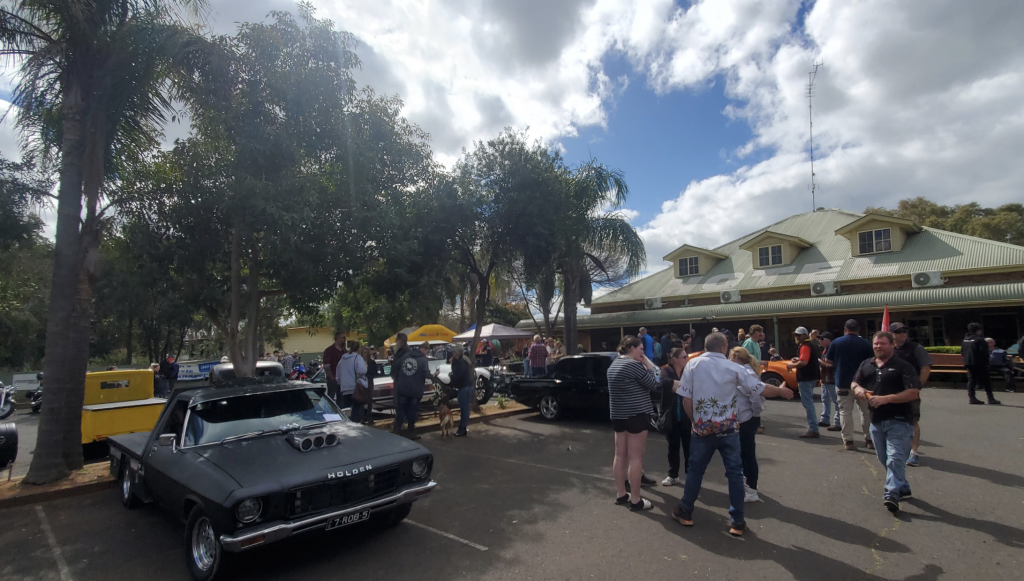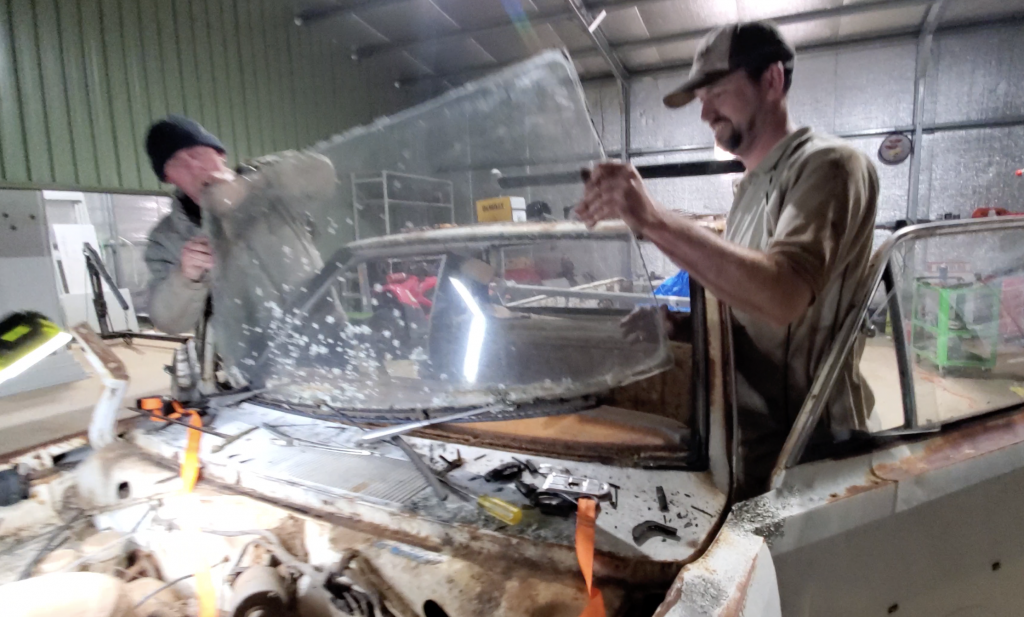“I’m not asking anymore,” my Australian host Laurence declared as he wielded a plasma cutter and slid under the ute that was supposed to have been the car I was going to spend four weeks fixing. The goal had been to drive the machine to the craziest ute show on earth, the Deni Ute Muster, only the problem was that the ute was in far, far worse shape than I’d expected. My only hope was to ditch it and use the parts ute Laurence had picked up as the main project. Flames shot from the now-parts ute’s bed as Laurence’s trigger finger held firm and blasted a giant hole through a main unibody rail. He, a neighbor, some friends, and I were conducting surgery on “two” utes that, really, together combined to form about three-quarters of a ute — all in an attempt to build one. Our math was clearly off, but we didn’t care. Here’s a look at our welding, cutting, drilling, and hammering operation — along with some incredible peeks at Australian culture thanks to a rural Holden collector named John and an awesome car show in the small city of Dubbo, New South Wales.
The first few days after my arrival in Australia from Detroit were a total blur. I was trying to wrench from 9 A.M. to 10 P.M., edit and write articles from 10 P.M. to 3:30 A.M., and then sleep from 3:30 to about 8:30 — all the while trying to shake off jet lag associated with flying 20 hours from a time zone 14 hours back. It didn’t work. My editing and writing were crap, and my wrenching was also crap; I was losing every tool that came into my possession, I was making mistakes left and right (at one point I had to be told how to hold a set of pliers), and there was somehow a zoo involved.
The Blurry First Few Days: An Intro To Dubbo
Specifically, it was the incredible Dubbo Zoo to which people travel from far and wide. It’s all a bit fuzzy, but as I recall I arrived in Sydney with heavy bags of tools and car parts, spent a few days there, then took a seven hour train ride to Dubbo, where I saw my ute for the first time. Laurence and I put the vehicle on the lift, I decided that it was a disaster and that somehow the parts car was better, then Laurence and I learned that the engine we’d planned on using was seized due to rust in the cylinders. With all this bad news swirling through my fatigued brain, it only made sense to mix in some elephants and giraffes and rhinos.
Laurence was out of town, and the utes were at his mom Jan’s place; nobody trusted me to drive from Laurence’s out to her paddock to wrench on my own since my brain was too mushy to drive on the right side of the road, let alone the wrong one. So Jan, a hilarious and warm person who greeted me with gifts (including socks with emus on them) and taught me some incredible cockney slang (“frog and toad” means “road,” and “tin lids” means “kids”), figured this was a good opportunity to show me around Dubbo. We first visited a museum for the Royal Flying Doctor Service, which is a fascinating organization that provides medical aid to every corner of Australia’s vast, open land. Without it, getting injured in the outback could spell death.

Then we visited the Dubbo zoo, which is a world class drive-through animal exhibit that was completely empty when we were there. It was honestly incredible to have the whole place to ourselves:



Hopping around the zoo, but not part of the exhibit, were dozens of kangaroos, including this one with its pouched joey:

After Jan showed me around town, Laurence gave me a brief walkaround of the car culture side of Dubbo. We stopped by a mechanic he knew and checked out a front clip of a Toyota — apparently buying entire front sections of cars from Japan is a common thing.

Usually the aim is to either snag body parts or, in this case, a mighty 2JZ:

We met the two longtime friends Callum and Henry, who run Iron Knuckle Fabrication — a custom car shop in town. The work they do is spectacular:

We stopped by the neighbor’s house to look at his hot rod. The neighbor’s name is Hud:

Then Laurence gave me the keys to his blue Subaru Impreza, which would be my wheels for the next four weeks, and which I’d find to be one of the greatest cars I’ve ever driven (more on that later):

The final bit of introduction to Dubbo involved Laurence showing me his garage (shed, as Australians call it), and then presenting hundreds of parts he’d been amassing for Valiants over the years — many of them recent acquisitions in preparation for this build.

Assessing The Rust
Our primary focus the first few days of wrenching was to get the body of the former parts ute (which hereafter I’ll refer to as “Project Cactus” or simply “Cactus” after the Australian slang word meaning “thoroughly broken”) all patched up, as it made little sense to install parts on a compromised shell. As a reminder, here’s that shell we started out with, and that we were tasked with — in four weeks — getting running, driving, through Australia’s strict inspection, and then through a 750 mile road trip:

The main areas of rust included the bed (or tray, as they say in Australia):

Removing the homemade fuel tank revealed even more rust holes and odd little rust pockmarks all over the bed floor:


The cabin floors looked okay at first, but a bit of prodding with a screwdriver revealed a number of holes. Both pans would need to be patched:


And the rear quarter panel, just aft of the right rear tire, had rusted out due to dirt and grime having entered the wide open inspection cover in the inner bedside:


If you look carefully, you can see leaves piled up in that access panel; dirt and grime rest at the bottom of that quarter panel, contributing to the rust:

Cutting, Grinding, Welding: Fixing The Body
Though I was a bit startled by the shape of the utes when I arrived in Dubbo, Laurence understood the magnitude of the project, which is why he’d done everything he could to give us a chance to get this thing up to snuff in the four weeks allotted. Not only had he amassed a giant pile of spare parts, he’d also chatted with darn near every car enthusiast in Dubbo to feel out if they’d be interested in lending a hand. If there were two things we’d need to pull this thing off, it was man-hours and parts, and Laurence did his part to get us both.
His brother Mitch, his neighbor Hud, and his friend Ben joined the two of us as we hacked away at the rust. I used an angle grinder to carve out the brown in the rear quarter panel while Hud broke out the plasma cutter to hack off the front foot or so of the bed floor:



The neighbor plasma cutting while I simultaneously sliced up that rear quarter made for a beautiful light show.

When Hud was done cutting out the floor, he replaced a rusty crossbeam he had to cut with a bit of square tubing, which he tack-welded into place. I then set out to find us a replacement floor panel:


The now-parts-ute’s floor was also rusty near the cab, but the rear section was in nice shape, so I cut that out. Of course, removing it wasn’t that simple.

Not only was the fuel tank fastened to it (you can see Laurence yanking the tank out above), but the floor was tack welded to the main unibody rails. And though we tried our best to drill out those welds, the floor just wouldn’t pry off.

The solution was Laurence going ham with the plasma cutter:

This is the look of a man who doesn’t have time for bullshit, and who solves things usually with precision, but when necessary, with brute force;

Here’s the floor we cut out:

From there, Laurence broke out both chisels — the pneumatic chisel to remove the fuel tank brackets from the bottom of the floor, and also “Cold Chisel,” the legendary Australian rock band. Laurence played “Khe Sanh” and “Cheap Wine” over his bluetooth speaker pretty much constantly, and I have to admit, I fell in love with the music.

While we were hacking up the now-parts-ute’s rear floor, Hud was using some paper to sketch out the right shape to make a new floorboard:


I set out to cut the basic shape from a giant sheet of steel Laurence and I had picked up from a hardware store:

I also cut out some patches for the huge speaker holes someone had sliced into the parcel shelf just behind the bench seat. These holes go to the outside, and as the shelf is a structural part of the unibody, Laurence reckoned a safety inspector would want them patched:

Eventually we took a break; Jan served us black tea and scones with jam and cream. I cannot communicate how delicious those creamy, jam-y scones were in the midst of all that wrenching. Each bite was heavenly.


Before Hud started welding our patch panel into the bed, we needed some non-rusty surfaces to weld to, so Laurence did some grinding:

Hud also did some grinding along with a bit of cutting to accommodate the wheel wells:

Then Laurence and Hud dropped the patch into place.

Laurence had to stand on the patch to squeeze it down against the ute’s bed floor to which Hud was welding.



The welding continued late into the night. The kangaroo-hunting ute that I’d flown 10,000 miles to fix sat out front, kindly sacrificing itself to help get Cactus back on its feet after probably decades of neglect.

Laurence, his girlfriend Bek, Hud, his wife Joanne, and I enjoyed some delicious chicken “Schnitties” before turning in for the night. We’d tacked in a new floor on the front of the bed, we’d cut out some of the quarter panel, we’d made up a few floorboard patches, and we’d cut out a few patches for the parcel shelf — but we were still far, far away from having even a viable body shell. The idea of a running, driving car seemed so, so distant.
Exploring Dubbo’s Amazing Car Culture

Despite all the work we still had ahead, Laurence and I took a break to enjoy my first Sunday in Dubbo. The Cars & Coffee was enormous, and filled with some of the most incredible Australian cars ever made, along with some wild customs.

[Editor’s Note: Spit take. – JT]


Then, after Cars & Coffee, there was another car show at the local pub, where I spotted a rare, Australia-built, Ford-engined Jeep that I’d never heard of, and I met a kid who’d hilariously installed a big turbo on his little dirtbike.


I’ll write more about the car shows in a later article. For now, I’ll mention where Laurence and I drove after the second car show: To John’s house.

John is a prolific Holden collector whose real passion is the “Sandman,” which came in both ute and van form:


The Sandman, launched in the early 1970s, was a special edition Holden that was, for the most part, marketed to surfers. It came with a zany paint job, and could be had with mag wheels, a big V8 engine, and a four-speed manual transmission. Apparently a sunroof and a mattress were two popular options. This was the ultimate hippie-mobile, and John owns multiple:



John gave me a ride in his Holden Monaro GTS, allowing me to briefly experience for the first time the mighty Australia-engineered Holden V8:
John then gave me a tour of his property, on which sat Australian legends like the Holden One-Tonner and the mighty Barra engine — an engine beloved the world over for its ability to be tuned to make over 1,000 horsepower:
The following day, Laurence and I towed Cactus and the now-parts-ute to his place from his mom’s:


Getting the utes into the garage required a nice application of redneckery, or boganism as they’d say in Australia. We hooked a chain around the utes, hooked the other end of the chain to an ATV, and Laurence yanked the vehicles into his garage, at one point executing a four-wheel shed-skid. You can see Laurence in the background here on the ATV:

As soon as the Kangaroo ute was in the garage, Laurence, Hud, his wife Joanne, and I started taking it apart. Almost immediately, I spotted a giant Huntsman spider just inches from where I was working to remove a taillight:
I’d later run into dozens of giant spiders like this; you can read what it was like working in a garage filled with such arachnids in the article I wrote a little while back. It wasn’t optimal.

Laurence and Hud pulled the bench out of the now-parts ute, revealing the [edit: second] grossest floor I’ve ever seen, strewn with old bottles, shotgun shells, and just general filth:

We then yanked the windshield, which gave us access to the rusty dashboard, which we’d also need to install onto the other ute:



The next thing we yanked from the parts ute was the rear axle, since it was the right width, had the right wheel bolt pattern, and appeared to have less pinion-ring gear backlash than the wider axle on Cactus. Unbolting the axle from the ute was a bit of a pain in the arse, as was the case for unbolting darn-near everything on these old machines, but it was nothing a cutting disc couldn’t solve.

With the axle out, we popped off the differential cover, revealing a ring gear covered in diarrhea:


The gears looked good at first glance, but after rotating the ring gear 180 degrees, I saw deep pitting, which I promptly ignored.

The next day, when Laurence was at work, I installed the parts ute’s tailgate and driver’s door onto Cactus, and the thing started to look rather vehicular, if I do say so myself:

What was alarming was that it felt like we’d done so much work, and yet all we had was a bare body shell — hell, not even a full one. We were missing a hood, front fascia, and fender, plus all the locks and glass and linkages in one of the doors. We had no windshield, our floors still needed to be patched, the rear quarter panel needed to be welded up, we had no functional engine, the transmission we planned to use was in unknown condition, and that wiring that had sat outside in the elements for probably decades? Oh yeah, it featured plenty of frayed wires.
We’d worked our asses off the first week, and what we had to show for it would still be the worst carcass in any junkyard. But as usual, Laurence smothered me with optimism. “She’ll be right,” he assured me, almost hourly. I wanted to believe him.


I want updates….
This looks like so much fun. Except for the red ants and the spiders. Huntsman I can deal with. Redbacks not so much.
You’re insane….. great article! I admire your determination to not restore decent old cars, but the worst ones you can find.
Please wear hearing protection. Those grinders are loud.
Rusted engine cylinders? That’s what WD-40 is for.
“I saw deep pitting, which I promptly ignored.”
This is the secret to happiness in the philosophy of Davidism: Rust and rust-related damage does not exist. It is merely a construct of the mind. If you ignore it, nothing bad can come of it.
The scones with cream and jam look lovely. Scones with clotted cream are my all-time favorite treat whenever I’m in Great Britain. My German wife LOL’ed at “schnitty”, and immediately proclaimed that this is how she would refer to schnitzel from now on.
Great first/summary entry in the story, David. Can’t wait to see more wrenching on cringe-worthy hulks!
You’re doing it wrong! Cream goes on first, then the jam. Its basic cream tea
No, jam first. The jam sticks to the scone, and gives the cream something to try and stick to as well.
No way… everyone knows that toppings start with the most viscous: cream > jam
Civil wars have been fought over less.
Cornish and Devonshire regions have battled it out for centuries on the correct method. Queen Elizabeth II settled it a long ago: Cornish method (jam first then clotted cream).
I prefer Devonshire method because it’s easier to spread the clotted cream quite thick on scone before slathering the jam over the cream.
Cream then jam is *The Way*.
When you live in the south west of the UK you have to pick a side in the whole Devon/Cornwall feud, and I pick Devon.
John’s Sandman collection reminded me that I’ve seen the van version before. It’s the car that Max and his family drive in the first Mad Max movie. I then fell down a Holden rabbit hole to confirm my suspicion.
“Cundalini wants his hand back”
Every time I crawl under my Jeep I get depressed at the rusty state of it.
Then you come out with another article like this and I start to feel a lot better about my own problems.
I need to know more about that Beetle. It looks like a custom for an alternate-universe Torchinsky who wore Weird Al’s fat suit.
Crikey! She’s a ‘ute!
Ha, I visited my native Australia back in ’18 after not having been back since ’88 and found a model car store in downtown Melbourne. I had to pick up a scale model of something distinctly Australian. What did I pick? A Sandman panel van.
Also somehow the existence of Cold Chisel has escaped me until now. Guess my parents weren’t into them? They were definitely more into American music back then.
“Solid little nuggets.” Pure gold.
Excellent work so far. Week 1 travel sucks.